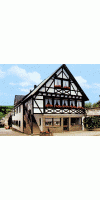Wine from Hahn

The Hahn Estate
The Hahn family has been in the wine business since 1650 and moved to Kobern, the present location, in 1892 to start a small winery. Konrad Hahn took over the operation in 1991, when his father retired, and works now with his Colorado-born wife Laurel Kerns-Hahn. The winery is recognized as one of the top estates in the region. The high quality of the wines is continuously confirmed by awards and medals received in regional and national as well as international competitions.
The Hahn Vineyard
The vineyards are located in Michelsberg, which is near the town of Piesport (Mosel Valley). In this most northern part, the Mosel valley is very narrow and the vineyards very steep. The warm micro climate and the use of terraces along the south facing slopes allows the vines to grow to full ripeness despite the northern location. The use of machinery is impossible and all work including harvesting is done by hand. The grapes for this wine were grown in slate soil, which is typical for the Mosel area and provides a unique minerality. The harmonious climate, warm summers and mild winters promote a long growing season providing fine fruit with balancing acidity and low alcohol.
A warm, but by far not as hot summer as 2003, continued into a beautiful sunny autumn. This allowed a perfect ripening of the grapes in 2005 vintage. Especially the always late ripening Riesling grapes achieved exceptional quality with must-weights similar to 2003 but with higher acidity levels and mineral concentration similar to 2004.
We view the 2005 vintage as the best vintage in our estate in years even though it is following several great vintages such as 2001, 2002 and 2003. We are very excited about this great vintage
No products found
- back
Selected Options
Wineries
Categories
Pricing
Countries
Regions
Grape Types
Wineries
Organic/Free Shipping
Betz Family Cabernet Sauvignon Pere de Famille is 88% Cabernet Sauvignon, 10% Petit Verdot and 2% Merlot
Review:
"This is a wine for the ages. Aromas of thyme, the blackest of cherries, licorice, bay leaf and spice are followed by outright delicious, plump fruit flavors. There's a whole lot of primary fruit, with ample structure to hang it all on, along with plenty of depth and intensity. The finish is near endless. It flat-out impresses, with remarkable intensity. Best from 2028 to 2038. - SEAN P. SULLIVAN."
- Wine Enthusiast (September 2021), 95 pts
"A firm, polished red with aromas of blackberry, iodine, tobacco leaf, cocoa and cedar. It’s medium-to full-bodied with firm, chewy tannins. Structured, layered and focused. Lots going on, with a long finish. Try from 2023."
- James Suckling (May 2021), 95 pts
"Incorporating 10% Petit Verdot and 2% Merlot from a mix of sites in the Columbia Valley, the 2018 Cabernet Sauvignon Père De Famille reveals a healthy ruby/purple hue to go with beautiful cassis fruits interwoven with notions of dried rose petals, violets, cedary spice, and chalky minerality. Medium to full-bodied, reasonably well concentrated, yet elegant and beautifully balanced, it opens up nicely with time in the glass and will benefit from 2-4 years of bottle age and keep for 20 years."
- Jeb Dunnuck (May 2021), 95 pts
Jonive Estate Pinot Noir is made from 100 percent Pinot Noir.
This wine has a brilliant Burgundy color with a deep brooding nose that explodes out of the glass with aromas of orange peel, shiitake mushrooms, soy sauce, dried leaves, bay laurel and fall berries. The wine is a great balance between red and black fruit notes that saturate the palate with black tea, autumnal leaves, wood spice, dried citrus peel, and fennel. It is bright and fresh as well as deep and broad. This Pinot Noir is medium bodied combining silkiness with a nice grip of tannin, all with restrained alcohol that gives way to an amazingly complex and long finish that brings you back for another sip, another glass, and another bottle.
Review:
Ripe and succulent, showing a delicious set of raspberry and boysenberry fruit flavors dotted with dried anise, black tea and singed wood spice notes. This is rich yet defined and toasty yet fresh.
Wine Spectator 93 Points




